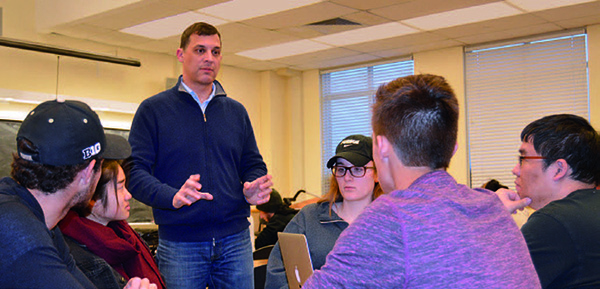Innovation: new undergraduate minor prepares students to lead
Many future engineering challenges will require innovation — new or different ideas introduced into use or practice that have a positive impact on society — and Purdue wants to ensure that today's students are prepared to tackle them.
In January 2017, the College of Engineering began offering courses for a new minor: innovation and transformational change. Joseph Sinfield, director of the college's Innovation and Leadership Studies Program, is spearheading the effort.
Sinfield, an associate professor of civil engineering, says he began developing the new minor a year ago because he sees a great need for students to gain experience addressing large-scale socio-technical problems.
"Often, problem-solving in engineering focuses on incremental developments,” Sinfield says. "However, many issues engineers will face after college involve complex, multi-faceted challenges, such as developing urban infrastructure, achieving environmental sustainability, facilitating renewable energy development and adoption, and enabling potable water availability. Achieving solutions to problems like these at a societal level may require a shift in paradigm — something non-incremental."
Students minoring in innovation and transformational change will take core classes dealing with problem-framing, solution space development, innovation and design fundamentals. The minor also requires an in-depth experiential learning opportunity for students to apply their skills to a grand challenge problem.
"Purdue engineering students are increasingly engaged in developing solutions to major challenges that have wide-ranging implications on society," says Mung Chiang, the John A. Edwardson Dean of Purdue's College of Engineering. "The new minor in innovation and transformational change, as pioneered by Professor Sinfield and other colleagues, provides students with rigorous methods to embrace stakeholder perspectives and design holistic solutions that achieve operational and economic sustainability. The mindset and the science of innovation help prepare Purdue engineers for leadership roles in the nation and around the world."
In other classes for the minor, students can develop perspectives and skills that are vital for addressing complex challenges through innovation. Sinfield believes that the minor will be especially beneficial to civil engineering students because it tackles many of the world's large-scale problems.
"When you think about the grand challenges we face — the environment, water, energy, infrastructure — these all rely upon civil engineering," Sinfield says. "Incremental steps won't keep pace with these growing problems; they require high-impact solutions and fundamental changes in human behavior."
Sinfield adds that the minor aims to instill a sense of discovery and persistence when dealing with adversity.
"Innovation is not easy to pursue, let alone to succeed at immediately, but we greatly increase our chances of success through rigorous and systematic problem-solving anchored in the success patterns of innovation science," he says. "We can't always be right, but we can certainly improve our odds."

Civil Engineering Associate Professor Joseph Sinfield offers suggestions to the student group consisting of (from left) Santiago Balzaretti, Vanessa Bahk, Eleanor Ericson, Ford Fisher and Yu-Chung Lin. The group has been tasked with the issue of reducing traffic in large cities.
